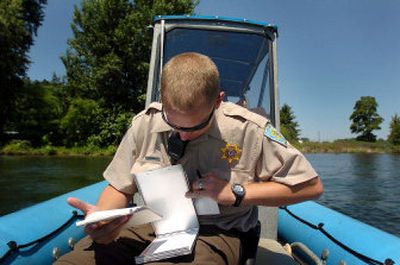Enforcing the law of the lake

Lake Coeur d’Alene and the Spokane River on Saturday officially became a playground for those who own things that float and go fast.
A combination of Saturday, hot weather and Ironman weekend brought a gaggle of boaters who churned the confined water space of the Spokane River into a wavy froth.
But sometimes that fun got out of hand. And then it became the domain of Kootenai County marine deputies, who use a cross between an aluminum jet boat and a rubber raft to make sure boaters are at least aware of the rules.
Deputies Tom Alexander and Matt Zirker hadn’t pulled their patrol boat 100 feet before Zirker started writing tickets for boaters who were violating the no-wake zone at the mouth of the river.
“This is our first really busy weekend,” Alexander said. “If we don’t stop them when they break the rules, then it just gets worse during the rest of the summer.”
They positioned their boat in plain view and watched boats entering a no-wake zone near the Cedars Floating Restaurant. It took only seconds for the deputies to flash the red and blue lights and power up to intercept a boater.
“You are going to write me a citation for that?” asked one frustrated boater who thought he was following the rule by going only 5 mph. Then he got the price: $57.
He made a reference to the son of God.
The next ticket recipient wasn’t as nice.
Stopped for making waves taller than 4 inches, the second boater also got a safety inspection. Both deputies made sure the boater had enough life jackets for everybody on board, a flotation seat that can be thrown to someone overboard and a working fire extinguisher.
Deputy Zirker gave the second boater an orange sticker that shows he passed the safety inspection, but he also got the $57 ticket for making too large a wake.
With tongue in cheek, he expressed appreciation at the price of the sticker while cursing. “I hope you have that 4-inch wake on film,” he said.
“The majority of people don’t have a problem with the ticket,” Alexander said. “That’s because it doesn’t count against your driving record, so your insurance rate doesn’t go up.”
The best line came from a couple who got the $57 ticket for violating the no-wake zone on a personal watercraft. “We were going to go to the (Spokane) Shock game tonight, but you ruined that.”
As the deputies got caught up on paperwork, a sleek ski boat gurgled past and a man called out a question. “How fast does that (patrol) boat go? 60? 70?”
Zirker called back: “80.” The man responded, “Wow. Cool.”
Zirker turned and smiled. “This thing goes 35 mph tops, but he doesn’t have to know that.”
While many boaters see the no-wake tickets as overkill, they serve a very real purpose, Alexander said.
“When boaters go too fast, the waves crash into docks. We try to minimize that because the waves can make people fall, causing injuries. They can also damage boats that get knocked into the docks,” he said.
During a five-hour stretch, the deputies wrote a handful of tickets, gave a few warnings, inspected dozens of boats to make sure they had the proper registration and gear, and had more than 30 citizen contacts.
Some people actually approached the deputies to get inspected so they could get the 2006 inspection sticker, which is a different color every year.
The worst transgression of the day was when a husband let his wife ride on the nose of a large cabin cruiser as it sped up the river.
He got hit with a misdemeanor for negligent operation because the boat wasn’t designed to have passengers ride in that location at high speed.
“It was the first time I rode up there,” the woman said. A judge must set the fine, but the deputies estimated it at about $400.
As they were handling the paperwork for that stop, a woman and a man on a personal watercraft came speeding past the patrol boat less than 50 feet away.
Alexander pounced on the throttle and wrote the 20-year-old woman a $57 ticket. Not much later, another man did the same thing, but the deputies were preoccupied.
Even though he was clearly violating the 50-foot rule, the man smiled and waved as he sped past. “He didn’t even know that he was breaking the rule,” Zirker said, shaking his head.
Ron Nilson, a new resident on the Spokane River, was cleaning up his 27-foot Cobalt at his dock when he called Alexander over to talk.
“I don’t think people understand the rules,” Nilson said.
As he talked, a boater pulling a skier zoomed up to the line of docks just feet away, violating the rule mandating no wake 100 feet from shore and docks. The distance is 200 feet in the main lake.
“At least with a driver’s license, they make you get some training and schooling,” Nilson said. “To get a boat, all you need is money.”
Nilson pointed out that people can lose their lives in a boat just as easily as when driving a car.
“The learning curve for operating a Jet Ski is never having been on it to three minutes later jumping waves. They’ve got to find a way to regulate that,” he said.
The deputies headed back up river and passed the same boater who cursed about his no-wake ticket. He yelled, “How do I look now?”
His boat had no wake.